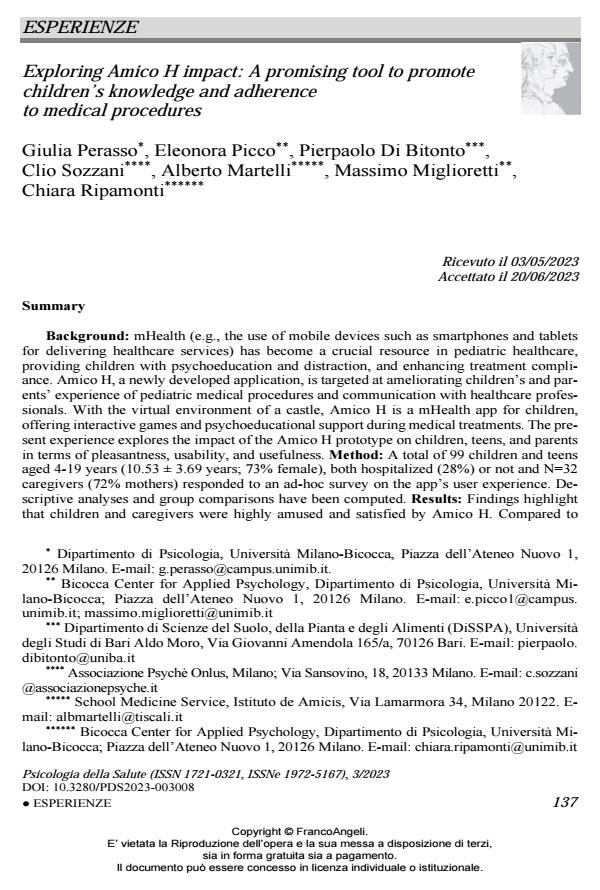Exploring Amico H impact: A promising tool to promote children’s knowledge and adherence to medical procedures
Journal title PSICOLOGIA DELLA SALUTE
Author/s Giulia Perasso, Eleonora Picco, Pierpaolo Di Bitonto, Clio Sozzani, Alberto Martelli, Massimo Miglioretti, Chiara Ripamonti
Publishing Year 2023 Issue 2023/3
Language English Pages 17 P. 137-153 File size 362 KB
DOI 10.3280/PDS2023-003008
DOI is like a bar code for intellectual property: to have more infomation
click here
Below, you can see the article first page
If you want to buy this article in PDF format, you can do it, following the instructions to buy download credits

FrancoAngeli is member of Publishers International Linking Association, Inc (PILA), a not-for-profit association which run the CrossRef service enabling links to and from online scholarly content.
mHealth (e.g., the use of mobile devices such as smartphones and tablets for delivering healthcare services) has become a crucial resource in pediatric healthcare, providing children with psychoeducation and distraction, and enhancing treatment compliance. Amico H, a newly developed application, is targeted at ameliorating children’s and parents’ experience of pediat-ric medical procedures and communication with healthcare professionals. With the virtual en-vironment of a castle, Amico H is a mHealth app for children, offering interactive games and psychoeducational support during medical treatments. The present experience explores the im-pact of the Amico H prototype on children, teens, and parents in terms of pleasantness, usabil-ity, and usefulness. Method: A total of 99 children and teens aged 4-19 years (10.53 ± 3.69 years; 73% female), both hospitalized (28%) or not and N=32 caregivers (72% mothers) re-sponded to an ad-hoc survey on the app’s user experience. Descriptive analyses and group comparisons have been computed. Results: Findings highlight that children and caregivers were highly amused and satisfied by Amico H. Compared to teens, children needed more help from adults in the use of the app. Conclusion: All the results indicate that Amico H is a pow-erful tool to ameliorate pediatric hospitalization experience and to promote children’s knowledge about health and medical procedures. The need for age-specific versions of Amico H emerged. Future directions and limits are discussed.
Keywords: mHealth, health communication, pediatric healthcare, hospital, children, parents.
- Fostering the psychological wellbeing of children diagnosed with cancer: multidisciplinary insights in pediatric oncology Giulia Perasso, Marco Romeo, Paola Coccia, Giulia Palego, Palina Perez-Duarte Mendiola, in Frontiers in Psychology 1495969/2025
DOI: 10.3389/fpsyg.2025.1495969
Giulia Perasso, Eleonora Picco, Pierpaolo Di Bitonto, Clio Sozzani, Alberto Martelli, Massimo Miglioretti, Chiara Ripamonti, Exploring Amico H impact: A promising tool to promote children’s knowledge and adherence to medical procedures in "PSICOLOGIA DELLA SALUTE" 3/2023, pp 137-153, DOI: 10.3280/PDS2023-003008